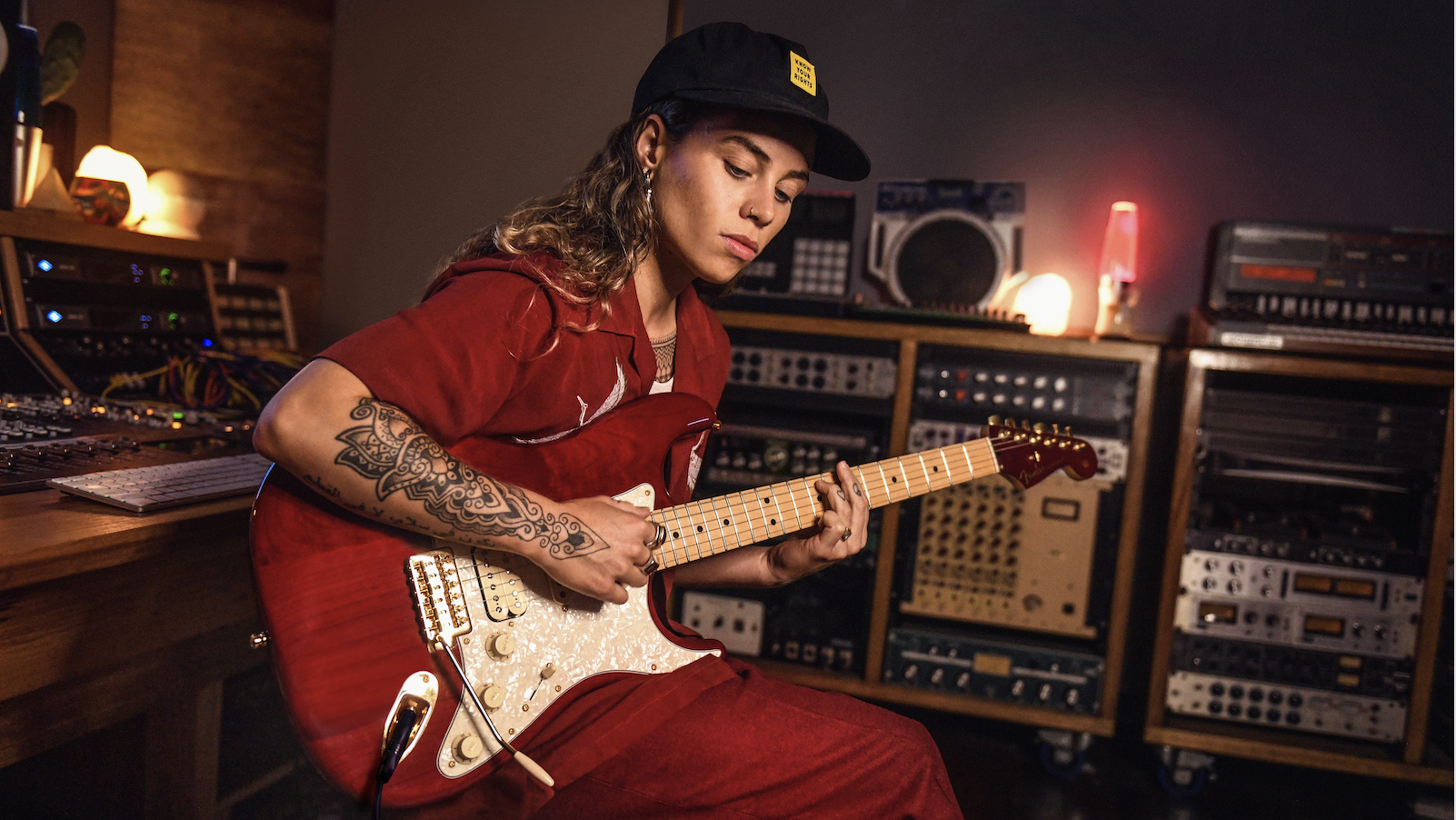Tash Sultana: "I wrote an album that coincided with the realisations I was having within myself"
After being forced to pause their typically ultra-turbulent schedule, Tash Sultana decided – against all plausible odds – that they actually appreciated living at a cruiser, more easygoing pace. And now they have an album of pure sonic euphoria to show for it.

Since the days when they’d stream bedroom-set jam sessions on YouTube, we at Australian Guitar have spouted nothing but love for Tash Sultana. But it’d be a lie to imply their chaotic energy was any shade of easy to work with: mania defines the multi-instrumentalist, hectic schedules, last-minute plot twists and spontaneous hops to foreign lands all the norm for an artist whose life moves at about 35 times the speed of the average human’s. Do they even sleep? (We’ve asked that, half-jokingly: the answer is “some nights”). Scoring the rare interview with Sultana means being extra flexible, since they almost always call early and refuse to wait around – and being especially choosy with questions, since they don’t have the time to f*** around with any small-talk.
At least, that’s how things were a few years ago. Since hopping off the touring cycle for their explosively successful Flow State album, Sultana made the unconventional decision to hide away for a bit before kicking off their second album era. A well-earned break led the 23-year-old rocker to a poignant epiphany: things don’t always have to be so excessively frenetic. It’s okay – crucial, even – to stop and take a deep breath every once in a while, look around and feel the ground beneath your feet.
Cue: Terra Firma, the long awaited follow-up to Flow State and a journey not just into new sonic territories that Sultana had never before thought to explore, but too some intensely transformative and mindset-altering bouts of self-actualisation and reckoning. It’s an album that only could exist with Sultana forced to hit the brakes on a trailblazing stint that had no end in sight – partially at the hand of the last year’s world-halting Coronavirus pandemic, but mostly Sultana’s own realisation that if they didn’t take a second to chill out soon, the inevitable burnout would’ve been impossible to recover from.
As they gear up to head back on the road for another whirlwind bout of world domination, we caught up with Sultana to riff on why Terra Firma will go down as perhaps their most essential body of work…
What’s the vibe like as you get pumped up for this new era? Are you as nervous or excited as you were the first time around, or have you almost gotten used to the hype?
I don’t know about the hype, man, I’ve been feeling pretty invisible this year. I think we all have – the lack of a normal world can make you feel a little bit miserable. But you’ve just got to keep trying to find where that validation is, and that’s been my journey this year. That’s a lot of what the album is about, and how it ended up the way that it did. But I’m not nervous at all. An album is just an extension of yourself as an artist; every time you make a new song, you’re just further extending your capabilities as an artist. Y’know how people always say things like, “Oh yeah, their fourth album is shit,” or, “I liked their other stuff”? I think that’s a bad attitude to have towards music, because it’s just art, y’know? It can go in whatever which way, and that’s the cool thing about it. And if you’re ever stuck, just get into the studio and co-write with people, try new stuff out, reinvent yourself! I don’t see why it has to be so f***ing serious.
So the phrase Terra Firma obviously refers to the Earth – “firm land” in Latin if we’re being totally literal. How is that title reflected on the album itself?
I’ve been living a really fast-paced life for quite a while, but when I got home at the end of last year, I had a handful of shows to wrap things up and that was it. Everything stopped. All the tours were cancelled, all the holidays were cancelled… The world hit a pause. Everyone was just waiting for me to snap and lose my mind, because I’m just naturally so wild. I can’t sit still, I get bored super easy, I have really bad ADHD and all that – but I was just really chill. I was really mellow throughout the whole thing, and I enjoyed every lesson that I learned about it all. And in that time, I wrote an album that coincided with the realisations I was having within myself, which was that I’m at a really nice place at 25, I’m really thankful for everything that I’ve learned and I’m really thankful for all the people around me. I just felt super grounded.
Did you find yourself wanting to explore any new approaches to the guitar on this record?
Yeah, I did. It’s all I did – every day was just practise, practise, practise! I’ve got a little Sunday-to-Saturday whiteboard schedule; I have to write everything down to stay focussed, and that’s been a total livesaver. So on a Monday I would practise piano scales, for example, and I’d do vocal warmups every day just to keep my voice nice and strong. Because singing is kind of like running a marathon: you can’t just get up and run a marathon and expect to not do any damage – you’ve gotta keep training. And you’ve got to do the same with your voice and your playing, otherwise your talents start to wither away. There’s no shows on, but there’s plenty of time to get really deep into theory and technique and all of that. So I would just be like, “Monday is piano, Tuesday is trumpet, Wednesday is guitar, Thursday is drums, blah, blah, blah…” And I practised entirely new rudiments and scales.
Get The Pick Newsletter
All the latest guitar news, interviews, lessons, reviews, deals and more, direct to your inbox!
Speaking of the guitars themselves, what gear went into making this record?
I pretty much used only three electric guitars. I used my 1960 Fender Custom – it’s like a heavy relic in this crazy light blue finish. I’ve swapped out the pickups in all of my guitars, and that one has a DiMarzio single-coil on the back. That guitar made it onto the majority of the record, and then I actually used a Gretsch for all of the warmer, thicker sounding rhythm parts. I has 11-52 gauge strings on that one; usually I go for the nines, but for that guitar I keep it nice and thick. And then the last guitar I used was my signature Stratocaster.
Which just hit shelves! Congratulations! What was it like getting down to the nitty-gritty with Fender?
It took a little bit of time, hey. That guitar took about 18 months to make, from the first prototype to the production kit – which ended up being totally different to the guitar we had at the start. The first prototype was a really deep brown and had a rosewood body. But you’re not allowed to manufacture guitars in rosewood anymore, that was a new law that passed recently, so we had to change our course of direction. But I had this really, really nice American Pro Series Strat, and I thought, “Man, this is a nice guitar!” I’d used that a lot on the first record and on tour, and I realised: people are really fond of these because it’s kind of like a new-age Strat where it’s got the technology of today, but it’s also incorporated the sound of the Strats from the ‘50s and the ‘60s.
So it’s basically an American Pro Series Strat with a few little custom changes, like a single-coil tap and Yosemite pickups. We gave it this really bold Cherry Red coat – it’s actually a stain that Fender has never used before, and they won’t use again. I’m a massive fan of gold hardware, too, so we chucked that bling all over the guitar. It used to have a different scratchplate – it was tortoiseshell, but I swapped it out for the pearl because it made the red pop much more. And I just wanted it to be an affordable Stratocaster that young players of any gender could appreciate. It’s custom made by me, but it’s for everybody else. I even put my logo on the back, because I didn’t want that to deter somebody away from the guitar if they’re not a fan of mine; they don’t have to flash my logo around.

Ellie Robinson is an Australian writer, editor and dog enthusiast with a keen ear for pop-rock and a keen tongue for actual Pop Rocks. Her bylines include music rag staples like NME, BLUNT, Mixdown and, of course, Australian Guitar (where she also serves as Editor-at-Large), but also less expected fare like TV Soap and Snowboarding Australia. Her go-to guitar is a Fender Player Tele, which, controversially, she only picked up after she'd joined the team at Australian Guitar. Before then, Ellie was a keyboardist – thankfully, the AG crew helped her see the light…
“I knew the spirit of the Alice Cooper group was back – what we were making was very much an album that could’ve been in the '70s”: Original Alice Cooper lineup reunites after more than 50 years – and announces brand-new album
“Such a rare piece”: Dave Navarro has chosen the guitar he’s using to record his first post-Jane’s Addiction material – and it’s a historic build




![[from left] George Harrison with his Gretsch Country Gentleman, Norman Harris of Norman's Rare Guitars holds a gold-top Les Paul, John Fogerty with his legendary 1969 Rickenbacker](https://cdn.mos.cms.futurecdn.net/TuH3nuhn9etqjdn5sy4ntW.jpg)





